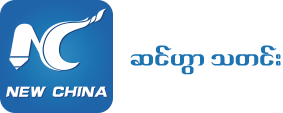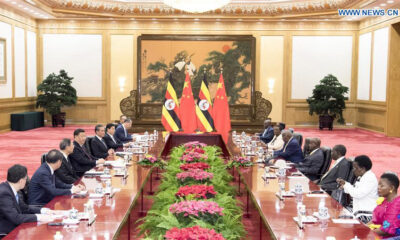Media
ယူဂန္ဓာနိုင်ငံတွင် အီဘိုလာရောဂါ ကင်းစင်ကြောင်း ကြေညာ
ကန်ပါလာ၊ ဇန်နဝါရီ ၁၃ ရက် (ဆင်ဟွာ)
ယူဂန္ဓာနိုင်ငံတွင် အီဘိုလာ ဆူဒန် ဗိုင်းရပ်စ် (Ebola Sudan Virus) အသစ်ဖြစ်ပွားမှုမရှိသည်မှာ ရက်ပေါင်း ၄၂ ရက်ကျော် ရှိပြီးနောက် နိုင်ငံအတွင်း အီဘိုလာရောဂါ အဆုံးသတ်ပြီဖြစ်ကြောင်း ယူဂန္ဓာက ဇန်နဝါရီ ၁၂ ရက်၌ ပြောကြားခဲ့သည်။
ကမ္ဘာ့ကျန်းမာရေးအဖွဲ့ (WHO) ၏ သတ်မှတ်ချက်အရ နိုင်ငံတစ်နိုင်ငံအနေဖြင့် အီဘိုလာရောဂါ ကင်းစင်ကြောင်း ကြေညာရန် ရောဂါအသစ်ဖြစ်ပွားမှု မရှိဘဲ ရက်ပေါင်း ၄၂ ရက် (ဗိုင်းရပ်စ်၏ ရောဂါပျိုးချိန်၂၁ ရက် နှစ်ကြိမ်) ရှိရန် လိုအပ်သည်။
ကမ္ဘာ့ကျန်းမာရေးအဖွဲ့ ညွှန်ကြားရေးမှူးချုပ် Tedros Adhanom Ghebreyesus က အဆိုပါ ဗိုင်းရပ်စ် တိုက်ဖျက်ရေးအတွက် အားသွန်ခွန်စိုက် ဘက်စုံတုံ့ပြန်မှုအတွက် ယူဂန္ဓာနိုင်ငံနှင့် မိတ်ဖက်အဖွဲ့အစည်းများကို ဂုဏ်ယူကြောင်း ပူးတွဲကြေညာချက်၌ ပြောကြားခဲ့သည်။
“ပထမဆုံး ရောဂါတွေ့ရှိပြီး လေးလအကြာ ဒီကနေ့မှာတော့ ယူဂန္ဓာနိုင်ငံမှာ အီဘိုလာရောဂါ အဆုံးသတ်သွားပါပြီ။ ယူဂန္ဓာအစိုးရ၊ ပြည်သူတွေနဲ့ ကျန်းမာရေးဝန်ထမ်းတွေ၊ အသက်ဆုံးရှုံးခဲ့ရသူတွေ၊ ဒီလိုရောဂါအဆုံးသတ်စေဖို့ စိတ်နှစ်မြှုပ်ပြီး စွမ်းဆောင်ခဲ့သူတွေကို ဂုဏ်ယူကျေးဇူးတင်ပါတယ်။ အရင်းအမြစ်တွေ စုစည်းပေးတဲ့အတွက် အလှူရှင်တွေနဲ့ မိတ်ဖက်အဖွဲ့အစည်းတွေ၊ အချိန်တိုအတွင်း အဆိုပြုကာကွယ်ဆေးတွေ ရရှိအောင် ဖော်ထုတ်ပေးသူတွေကို ကျေးဇူးတင်ပါတယ်။ အီဘိုလာရောဂါအမျိုးအစားအတွက် ခွင့်ပြုပြီးသား ကာကွယ်ဆေးတွေ ဒါမှမဟုတ် ရောဂါကုထုံးတွေ မရှိတာတောင်မှ ရောဂါထိန်းချုပ်ဖို့ အတည်ပြုပြီးသား ပြည်သူ့ကျန်းမာရေး ကိရိယာတွေကို အသုံးပြုနိုင်ခဲ့ပါတယ်” ဟု ကမ္ဘာ့ကျန်းမာရေးအဖွဲ့ ညွှန်ကြားရေးမှူးချုပ် Tedros Adhanom Ghebreyesus က ပြောခဲ့သည်။
အာဖရိကဆိုင်ရာ WHO ဌာနေညွှန်ကြားရေးမှူး Matshidiso Moeti ကလည်း ယူဂန္ဓာနိုင်ငံအတွင်း ကူးစက်ရောဂါ တုံ့ပြန်ရာမှာ ကာလရှည် အတွေ့အကြုံက အရေးပါတဲ့နေရာတွေကို လျင်မြန်စွာ ကိုင်တွယ်ဆောင်ရွက်နိုင်ခဲ့ကြောင်း ပြောကြားခဲ့သည်။
WHO ၏အဆိုအရ အီဘိုလာရောဂါသည် ဆူဒန် အီဘိုလာ ဗိုင်းရပ်စ်ကြောင့် ဖြစ်ပွားခဲ့ခြင်းဖြစ်ပြီး အီဘိုလာ ဗိုင်းရပ်စ် မျိုးစိတ် ၆ ခုအနက် တစ်ခုဖြစ်ကာ ယင်းအတွက် ကုထုံးများနှင့် ကာကွယ်ဆေးများ ခွင့်ပြုထားခြင်းမရှိသေးကြောင်း သိရသည်။
“ယူဂန္ဓာမှာ ဆူဒန် အီဘိုလာ ဗိုင်းရပ်စ် ဖြစ်ပွားကြောင်း ကြေညာပြီးမကြာမီမှာ လက်တွေ့စမ်းသပ်ဖို့ အဆိုပြုထားတဲ့ ရောဂါကုထုံးတွေနဲ့ ကာကွယ်ဆေးတွေကို စိစစ်ဖို့ ကာကွယ်ဆေးထုတ်လုပ်သူတွေ၊ အလှူရှင်တွေနဲ့ ယူဂန္ဓာကျန်းမာရေးအာဏာပိုင်တွေနဲ့ အလုပ်လုပ်ခဲ့ကြပါတယ်။ ကာကွယ်ဆေး အဆိုပြုမှု ၃ ခုကို ရွေးထုတ်နိုင်ခဲ့ပြီး ပထမဆုံးကာကွယ်ဆေးဟာ ၂၀၂၂ ခုနှစ် ဒီဇင်ဘာ ၈ ရက်မှာ ရောက်ရှိလာခဲ့ပါတယ်” ဟု အာဖရိကဆိုင်ရာ WHO ဌာနေညွှန်ကြားရေးမှူး Matshidiso Moeti က ဆိုသည်။
ထို့ပြင် ၎င်းက ဆက်၍ “ဒီကနေ့မှာ အီဘိုလာရောဂါ တရားဝင်အဆုံးသတ်သွားပြီဖြစ်လို့ ဒါဟာ အနာဂတ်မှာ ဖြစ်ပေါ်လာနိုင်တဲ့ ရောဂါတွေကို တုံ့ပြန်ရေးနဲ့ သင်ခန်းစာတွေကို ပြန်လည်သုံးသပ်ဖို့ မရှိမဖြစ် အရေးကြီးပါတယ်။ ဒီလိုရောဂါ တုံ့ပြန်မှုနဲ့ ကနဦးစိန်ခေါ်မှုတွေမှာ ရပ်ရွာလူထုရဲ့ ပါဝင်မှုက အဓိကအခန်းကဏ္ဍဖြစ်တယ်ဆိုတာ အပြည့်အဝ ဖော်ပြလိုက်တာလည်း ဖြစ်ပါတယ်။ ပုဂ္ဂလိက ကဏ္ဍ အပါအဝင် ကျန်းမာရေးစနစ်တစ်ခုလုံး ချိတ်ဆက်မှုရှိဖို့လိုတယ်ဆိုတာ ကျွန်မတို့တွေ မြင်တွေ့ခဲ့ရပါတယ်” ဟု ပြောခဲ့သည်။
ယူဂန္ဓာနိုင်ငံတွင် အီဘိုလာရောဂါ ကင်းစင်ကြောင်း ကြေညာလိုက်ပြီဖြစ်သော်လည်း ကျန်းမာရေးအာဏာပိုင်များအနေဖြင့် ရောဂါထိန်းသိမ်းစောင့်ကြည့်ခြင်းကို ဆက်လက်လုပ်ဆောင်သွားမည်ဖြစ်သလို ရုတ်တရက် ရောဂါတစ်စုံတစ်ရာ ဖြစ်ပေါ်လာပါကလည်း လျင်မြန်စွာ တုံ့ပြန်ရေး အသင့်ရှိကြောင်း WHO က ဆိုသည်။
ထို့ပြင် အိမ်နီးချင်းနိုင်ငံများအနေဖြင့်လည်း ကူးစက်ရောဂါဖြစ်ပွားမှုများ တွေ့ရှိခြင်းနှင့် တုံ့ပြန်ခြင်းဆိုင်ရာ စွမ်းဆောင်မှုများကို ဆက်လက်အားကောင်းမှုရှိစေရန်နှင့် သတိရှိကြရန် WHO က ဖြည့်စွက်ပြောခဲ့သည်။ (Xinhua)
……………………………………..
(English Version)
Uganda declares end of Ebola outbreak
Uganda on Wednesday said the Ebola Sudan Virus outbreak in the country has ended after no new case
The World Health Organization (WHO) requires that for a country to be declared Ebola-free, it should spend 42 days (two 21-day incubation cycles of the virus) without any new cases reported.
WHO Director-General Tedros Adhanom Ghebreyesus in a joint statement congratulated Uganda and its partners for the robust and comprehensive response to combat and defeat the virus.
SOUNDBITE 1 (English): TEDROS ADHANOM GHEBREYESUS, WHO Director-General
“Today marks the end of the Ebola outbreak in Uganda, four months after the first cases were reported. I congratulate the government, the people of Uganda and health workers, some of whom lost their lives, for their leadership and dedication in bringing this outbreak to an end. We thank donors and partners for swiftly mobilizing resources, and vaccine developers for making candidate vaccines available in record time. Even in the absence of approved vaccines or therapeutics for this type of Ebola, Uganda was able to use proven public health tools to contain the outbreak.”
WHO Regional Director for Africa Matshidiso Moeti said Uganda’s long experience in responding to epidemics allowed the country to rapidly strengthen critical areas of the response.
According to the WHO, this Ebola outbreak was caused by the Sudan Ebola virus, one of six species of the Ebola virus, against which no therapeutics and vaccines have been approved yet.
SOUNDBITE 2 (English) : MATSHIDISO MOETI, WHO Regional Director for Africa
“Soon after Uganda declared the Sudan Ebola virus outbreak, we worked with vaccine developers, donors and the Ugandan health authorities to identify candidate therapeutics and vaccines for inclusion in trials. Three candidate vaccines were identified, and the first doses arrived in the country on 8 December 2022, constituting a historic milestone in the global capacity to respond to outbreaks and prevent them from becoming pandemics.”
SOUNDBITE 3 (English) : MATSHIDISO MOETI, WHO Regional Director for Africa
“As the outbreak officially ends today, it is essential that we review the response and lessons we learned for future outbreaks. The key role that communities play was amply demonstrated in this response and its initial challenges. We also saw the need to engage the entire health system, including the private sector.”
The WHO said although the outbreak in Uganda has been declared over, health authorities are maintaining surveillance and are ready to respond quickly to any flare-ups.
Neighboring countries remain on alert and are encouraged to continue strengthening their capacities to detect and respond to infectious disease outbreaks, the WHO added.






